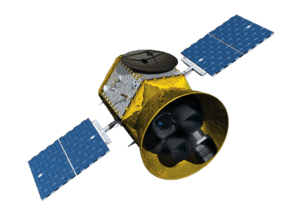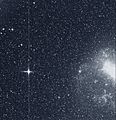Transiting Exoplanet Survey Satellite facts for kids
The Transiting Exoplanet Survey Satellite (TESS) is a special NASA space telescope. Its main job is to find planets that orbit stars other than our Sun. These planets are called exoplanets.
TESS was launched into space on April 18, 2018. It went up on a SpaceX Falcon 9 rocket from Cape Canaveral Air Force Station. The launch cost about US$87 million.
How Does TESS Orbit Earth?
TESS orbits Earth in a special way. It takes about 14 days to complete one trip around our planet. This is half the time it takes for the Moon to orbit Earth.
Its orbit is very elliptical. This means TESS gets very close to Earth at some points and then swings very far away at other times.
TESS has four powerful cameras. These cameras are always taking pictures of the sky. TESS sends these pictures back to Earth. Scientists then study them to learn new things. People who love astronomy can also download and look at these amazing photos!
What Is TESS Looking For?
The main goal of TESS is to find planets orbiting other stars. It looks for a special event called an occultation.
An occultation happens when a planet passes in front of its star. When this happens, the planet blocks some of the star's light. This makes the star look a little dimmer for a short time. TESS is designed to notice these tiny dips in a star's brightness. By finding these dips, scientists can discover new exoplanets!
TESS is not a very big satellite. It is about 1.5 meters (5 feet) tall. Its solar panels stretch out to about 3.7 meters (12 feet) wide. When it launched, it weighed about 350 kilograms (770 pounds).
Images for kids
-
TESS – first light (August 7, 2018)
-
The Falcon 9 rocket carrying TESS, launching from Space Launch Complex 40 at Cape Canaveral in April 2018.
-
Test image taken before the start of science operations. The image is centered on the constellation Centaurus. In the top right corner the edge of the Coalsack Nebula can be seen, the bright star in the bottom left is Beta Centauri.
See also
 In Spanish: Satélite de Sondeo de Exoplanetas en Tránsito para niños
In Spanish: Satélite de Sondeo de Exoplanetas en Tránsito para niños
 | Janet Taylor Pickett |
 | Synthia Saint James |
 | Howardena Pindell |
 | Faith Ringgold |







